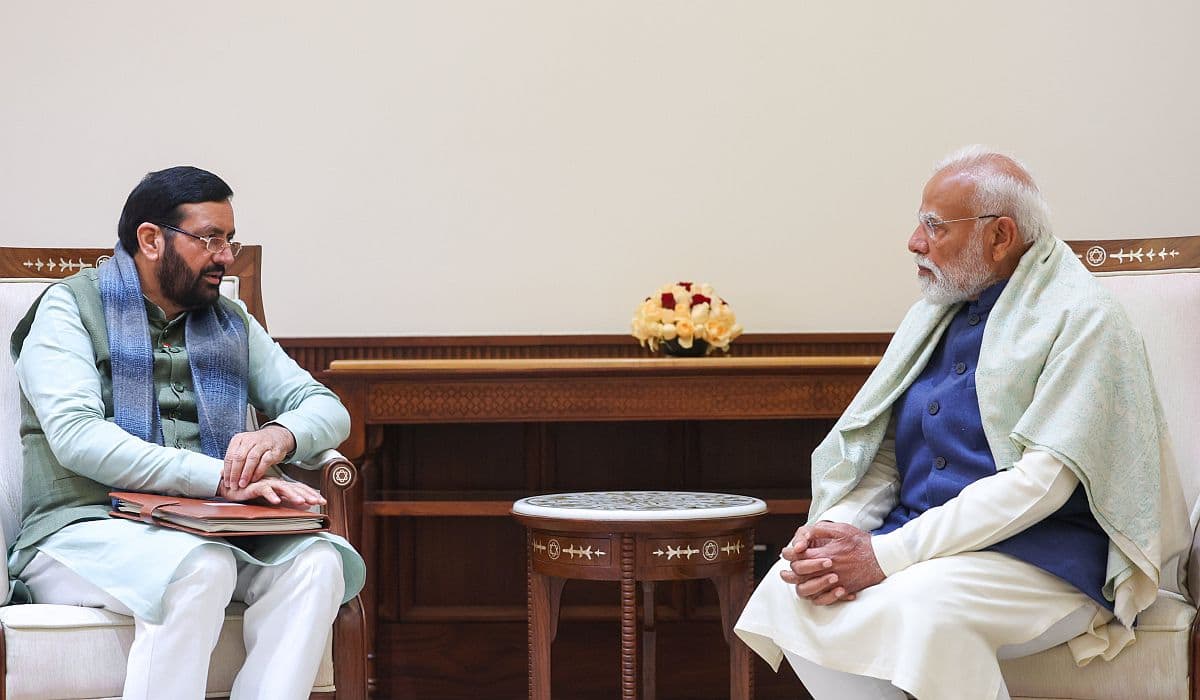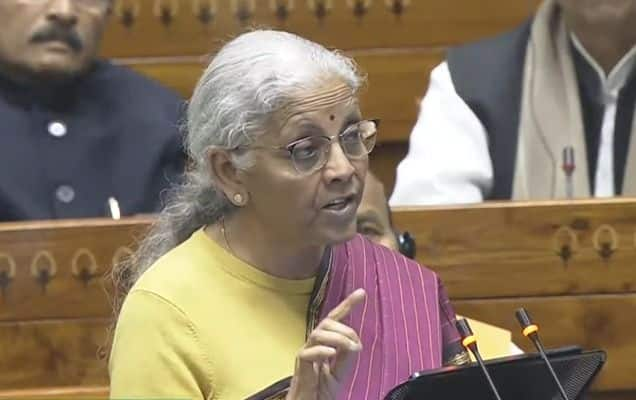The Prime Minister, Shri Narendra Modi, today inaugurated and laid the Foundation Stone for several development projects at Silvassa in Dadra and Nagar Haveli.
He laid foundation Stone of Medical College in Sayli, Dadra and Nagar Haveli.
Prime Minister released IT policy for Dadra and Nagar Haveli. M-Aarogya mobile app and door to door waste collection, segregation and processing of Solid Waste in Dadra & Nagar Haveli was also launched. He also distributed Gold cards to beneficiaries of Ayushman Bharat and distributed Van Adhikar Patra to the beneficiaries.

Addressing the public gathering Prime Minister said today inauguration or foundation stone laying of Projects worth more than Rs 1400 crore has been undertaken. He added that these projects are linked to various aspects of connectivity, infrastructure health, education etc.
He said New Industrial policy and new IT policy has been launched to give a boost to Industries.
PM reiterated his Government’s commitment for the welfare of the citizens of the country. He said, we are working on the mantra of Sabka Saath Sabka Vikas.

He noted that both Daman and Diu, and Dadra and Nagar Haveli have been declared open defecation free. Both the Uts have also been declared Kerosene Free. He added that today every household in both the UTs has LPG connection, electricity connection, water connection.
PM mentioned that under Pradhan Mantri Awas yojana, poor residents of both the UTs have been allocated houses. Gold Cards have also also been issued to the people in both UTs entitled for benefits under Ayushman bharat.
He mentioned that over the past 3 years, Investment worth Rs 9000 crores has been made in both the UTs, which has led to a series of development projects. He said that with the foundation stone laying of Medical College, Dadra and Nagar Haveli and Daman and Diu have got its first ever Medical College. He added that efforts are being taken to make Medical College functional this year itself. PM added that till date both UTs had only 15 Medical seats in a year and with the setting up of this Medical College , 150 seats will be available now. He said Medical College will provide improved medical facilities to the people.

Speaking on Ayushman Bharat, he said it is the World's biggest Heathcare Project and everyday 10 thousand poors are accessing the benefits of this scheme. In just 100 days since its inception over 7 lakh poor patients have been benefited.
He said that Under Pradhan Mantri Awas Yojana, a massive campaign to provide a permanent house to the poors in cities and villages is underway.
He said compared to previous government which built only 25 lakhs houses in 5 years, we have built more than 1 crore 25 lakh houses in 5 years.

Prime Minister also underlined that in Dadra and Nagar Haveli alone , 13000 women have been provided Free Gas Connections. He said efforts are being taken to ensure welfare of the tribal people. Under Van Dhan Yojana, Centres are being established for value addition in Forest Produce while several measures have been taken for preservation of tribal culture.
PM told that Dadra and Nagar Haveli has a huge potential for Tourism. Several initiatives are being taken to bring this area in the map of tourism.
He said under Blue revolution work is being done for increasing the income of Fishermen. A special Fund was set up to improve the fisheries sector. Rs. 7500 crores was arranged under this fund to give a boost to the sector.
Prime Minister Narendra Modi said that 125 crore Indians are his family and he is committed to working for their welfare.
सबका साथ-सबका विकास के मंत्र पर चल रही केंद्र की सरकार, विकास की पंचधारा के लिए पूरी तरह से समर्पित है।
— narendramodi_in (@narendramodi_in) January 19, 2019
बच्चों को पढ़ाई, युवाओं को कमाई, बुजुर्गों को दवाई, किसान को सिंचाई और जन-जन की सुनवाई, ये हमारे लिए विकास का राजमार्ग हैं: PM @narendramodi
आज दमन-दीव और दादरा-नगर हवेली, दोनों ही खुद को खुले में शौच से मुक्त घोषित कर चुके हैं।
— narendramodi_in (@narendramodi_in) January 19, 2019
आज दोनों ही क्षेत्रों के हर घर में LPG कनेक्शन है और दोनों ही केरोसिन फ्री भी घोषित किए जा चुके हैं।
आज दोनों यूनियन टेरिटरीज के सभी घरों में बिजली कनेक्शन है, पानी का कनेक्शन है: PM
आज इन दोनों क्षेत्रों में रहने वाले वो गरीब, जो प्रधानमंत्री आवास योजना के तहत घर पाने के योग्य हैं, उन्हें घरों की मंजूरी दी जा चुकी है।
— narendramodi_in (@narendramodi_in) January 19, 2019
आज दोनों ही क्षेत्रों के वो लोग, जिन्हें आयुष्मान भारत योजना का लाभ मिलना है, गोल्ड कार्ड जारी किए जा चुके हैं: PM @narendramodi
दवाई और पढ़ाई के साथ-साथ सरकार ये भी सुनिश्चत कर रही है कि कोई भी गरीब बेघर ना रहे।
— narendramodi_in (@narendramodi_in) January 19, 2019
प्रधानमंत्री आवास योजना के तहत गांव और शहरों के गरीबों को अपना पक्का घर देने का एक व्यापक अभियान चल रहा है: PM @narendramodi
बीते साढ़े 4 वर्षों से जिस कमिटमेंट के साथ, जिस स्पीड और स्केल पर गरीबों के घर बनाने का का काम चल रहा है, वो अभूतपूर्व है।
— narendramodi_in (@narendramodi_in) January 19, 2019
पहले की सरकार जहां अपने 5 साल में सिर्फ 25 लाख घर बनवा सकी थी, वहीं हमारी सरकार अब तक 1 करोड़ 25 लाख से अधिक घरों का निर्माण पूरा करा चुकी है: PM
ज़मीन हो, जंगल की पैदावार हो, पढ़ाई लिखाई हो, खेल से जुड़ी प्रतिभा हो, हर स्तर पर आदिवासियों के कल्याण के लिए व्यापक प्रयास हो रहे हैं।
— narendramodi_in (@narendramodi_in) January 19, 2019
वनधन योजना के तहत जो जंगल की उपज है उसमें value addition और उसके उचित प्रचार-प्रसार के लिए देशभऱ में सेंटर बनाए जा रहे हैं: PM @narendramodi
दादरा और नगर हवेली में पर्यटन के लिए बहुत संभावनाएं हैं।
— narendramodi_in (@narendramodi_in) January 19, 2019
इस क्षेत्र को टूरिस्ट मैप पर लाने के लिए सरकार हर संभव प्रयास कर रही है।
सिलवासा में बने दमनगंगा रिवरफ्रंट के पीछे की भावना भी यही है।
अब यहां आने वाले पर्यटकों के लिए एक और आकर्षण का केंद्र यहां बनकर तैयार है: PM
आज गरीबों के लिए, आदिवासियों के लिए, मध्यम वर्ग के लिए जितनी भी योजनाएं चल रही हैं, उनके मूल में सबका साथ-सबका विकास है: PM @narendramodi
— narendramodi_in (@narendramodi_in) January 19, 2019
जबकि वो दल जिसने दशकों तक देश में सरकारें चलाईं वो हर काम में अपनी या अपने परिवार की संभावनाएं देखता था। यही कारण है कि वहां काम से ज्यादा नाम पर जोर दिया गया: PM @narendramodi
— narendramodi_in (@narendramodi_in) January 19, 2019
इन्हें दिक्कत है कि मोदी भ्रष्टाचार के खिलाफ इतनी कड़ी कार्रवाई क्यों कर रहा है?
— narendramodi_in (@narendramodi_in) January 19, 2019
इन्हें परेशानी है कि सत्ता के गलियारों में घूमने वाले बिचौलियों को मोदी ने बाहर क्यों निकाल दिया: PM @narendramodi
इन्हें गुस्सा आ रहा है कि मोदी गरीबों का अधिकार छीनने वाले, उनके राशन, उनकी पेंशन हड़पने वाले दलालों को बाहर क्यों कर रहा है: PM @narendramodi
— narendramodi_in (@narendramodi_in) January 19, 2019
अपने इसी गुस्से की वजह से अब ये लोग एक महागठबंधन बनाने की कोशिश कर रहे हैं।
— narendramodi_in (@narendramodi_in) January 19, 2019
हालत ये है कि जो पहले कांग्रेस को पानी पी-पी कर कोसते थे, वो भी एक मंच पर आ गए हैं: PM @narendramodi
ये महागठबंधन अकेले मेरे खिलाफ ही नहीं, देश की जनता के भी खिलाफ है।
— narendramodi_in (@narendramodi_in) January 19, 2019
अभी तो ये पूरी तरह साथ आए भी नहीं है, लेकिन हिस्सेदारी पर कैसे मोलभाव चल रहा है, ये भी देश का नौजवान, देश का किसान, देश की महिलाएं, पहली बार वोट डालने जा रहे युवा साफ देख रहे हैं: PM @narendramodi
अपने परिवार, अपनी सल्तनत को बचाने के लिए ये कितने भी गठबंधन बना लें, अपने कर्मों से ये नहीं भाग सकते: PM @narendramodi
— narendramodi_in (@narendramodi_in) January 19, 2019
ये लड़ाई सकारात्मक सोच और नकारात्मक रवैये के बीच की है।
— narendramodi_in (@narendramodi_in) January 19, 2019
ये लड़ाई विकास और भ्रष्टाचार के बीच है।
ये लड़ाई जनता और महागठबंधन के बीच है: PM @narendramodi














